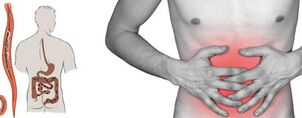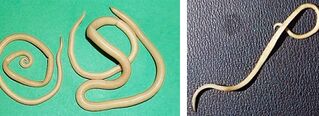
As you know, parasites are considered to be the most resistant organisms to the external environment. To date, about 250 species have been recognized as helminths capable of infecting humans. All of them pose a threat to health, and in worse cases, the lives of those infected. Knowledge of the types of helminths in humans and their characteristics greatly simplifies treatment and helps formulate effective prevention plans.
What worms do humans have?
It takes a lot of time to get used to this type of worm. The fact is that until now, scientists have not been able to provide the most detailed information on the classification of parasites. This is due to the fact that certain areas are characterized by the presence of certain helminthic invasions. In this case, it is almost impossible to obtain data on all types of human helminths present on Earth.
Thus, worms, most commonly diagnosed in the southern zone, are practically not found in the population of the northern geographical region. For temperate climate zones and central latitudes, about 20 species of worms are recognized as the most common. They can be conditionally divided into 3 main categories:
- Round parasitic worms (nematodes).
- Tape helminths (cestodes).
- Worm flat (trematode).
1. Helminths round and flat
Each of the above groups includes various types of parasitic organisms that require a brief description. In children and adults, it is most often necessary to treat representatives of worms belonging to the trematode class:
- Chinese coincidence;
- cat coincidence;
- happiness of heart.
Among the nematodes, there are 7 most famous and common species of parasites that inhabit the body at any age. Worms transmitted in the most likely way are:
- pinworms;
- worm ring;
- intestinal acne;
- whip worm;
- Trichinella;
- trichostrongylides;
- mine worm.
2. Cestode invasion
Tapeworms (or cestodes) are parasitic worms that pose the greatest threat to the body. The diagnosis of such helminthic attacks occurs less frequently than infections with round parasites in children and adults, however, infections with the following types of worms are fraught with the worst consequences:
- bullish ribbon worm;
- dwarf tapeworm;
- pig tapeworm;
- wide band;
- echinococcus;
- rat tape worms.
One of the rarest types of helminthic invasion is acanthocephalus. These include giant ridges and beaded ridges. Such worms can enter the body in the most rare cases, for example, when eating insects or larvae infected with parasites.
Why are worms dangerous to humans?
To adequately assess the level of patient health threat in the event of worm penetration, it is first necessary to determine the type of worm that belongs to him. Depending on the type of worm, its treatment and duration are determined. The main damage from the presence of parasites in the body is felt by the intestines - the main part of all helminths is localized in this organ. All the nutrients that should be absorbed and beneficial for a person are selected by worms.
Meanwhile, other types of worms do not just settle in the gut and "steal" all the necessary micro-elements from humans. They actively reproduce and affect other important human organs and systems. In addition to the heart muscle, liver and lungs, worms can cause significant damage to the brain and blood vessels. Worms can even infect the eyes.
The main cause of worm infections

You can protect yourself and your loved ones from the onset of the disease if you know how worms of a particular species enter the body. This is the only way to take all the necessary steps in a timely manner and minimize the risk of infection. It is known about the main delivery route:
- Infection occurs through soil and water. When walking on the ground with bare feet, the risk of laying eggs in it increases several times. Unconfirmed beverage sources and, in normal cases, water from normal water supply may contain worm larvae.
- Worm eggs enter the body along with animal products. The result of helminthic invasion is the processing of meat, fish, seafood, inadequate or low quality eggs. People who prefer exotic Asian cuisine are at risk of getting infected with worms. He, sushi, sashimi based on raw fish and meat.
- Some types of parasites can settle in the gut, after getting into it along with unwashed vegetables and fruits. Rejection of animal products does not solve the problem of the possibility of developing helminthiasis. Worm eggs, as already mentioned, can be contained in the soil. It is recommended to pour the fruit with boiling water before use.
- Worms are transmitted to humans and from animals. Pets are not often a source of infection for their owners. However, worms can be found in animals and in fur. From dogs and cats, parasitic eggs fall into the ground, spreading further with liquid water.
The spread of parasites from sick people
Worms can also be transmitted from one infected person to another. There are several ways to spread helminthic invasion:
- through unwashed hands (e. g. , when shaking hands, hugging);
- while using a regular appliance;
- while wearing other people's underwear;
- personal hygiene product group application by several people.
Pinworm eggs most often pass from person to person, often falling under the nail plate, staying there long. The prevalence of this type of worm in children is explained by the neglect of the basic rules of hygiene. A child can only pull his hand to his mouth or bite his nails, so that the cream worms do not have difficulty penetrating the new human body. The task of parents at this stage is to recognize the signs of helminthiasis in a timely manner and prevent the development of helminthic invasion in their infants, immediately begin to treat the disease.
Symptoms of acute stage of helminthiasis
It is not easy to detect early signs of a parasitic infection in adults or children. The diagnosis of the presence of worms is complicated by the fact that the incubation period in some species can last up to one and a half years.
As a rule, the first symptoms of a worm attack appear after a different period of time. In addition, the course of helminthiasis can be conditionally divided into 2 stages:

- acute stage (lasts on average no more than two months after the incubation period);
- chronic (characterized by the development of sexually mature parasites and can last for decades).
In the acute invasion phase, the main symptoms that are clearly expressed can be called allergic reactions. As a result of the production of antibodies to the migration of parasitic larvae, pathological manifestations in the skin should be noted. Indications of infection with worms of any kind in humans are the following symptoms:
- skin hyperemia;
- burning and itching sensations;
- small rash on the surface of the epidermis or mucous membranes;
- slight enlargement of lymph nodes;
- local edema;
- sternum pain (until drowning attack);
- vomiting and persistent nausea;
- diarrhea or constipation.
In addition, dangerous pathologies such as pneumonia, meningoencephalitis, hepatitis can be complications of appearance in the body of other beings.
Reliable confirmation of the presence of helminths in internal organs is the eosinophil index in clinical blood tests. The increase in the value of these particles is due to dysproteinemia - a violation of the normal number estimation between protein fractions.
Types of symptoms in the form of chronic diseases
Signs of chronic helminthiasis in humans are determined by localization of parasitic colonization. Simply put: the manifestation of the disease will depend on which organ will be the main habitat for a particular type of worm.
In particular, the most common parasitism in the intestines of ringworm can even persist without the slightest symptoms. If larger species are affected by worms, the symptoms of the disease will become apparent once the worms reach puberty. Dyspeptic disorders in adults and children, pain syndromes and neurotic manifestations are their hallmarks. Ascariasis is often characterized by the development of intestinal obstruction and pancreatitis, and the risk of oncological disease is increased.
Remedy for parasites
Need to undergo treatment of helminthiasis at the earliest possible stage. Effective therapy is if, before you start, you know exactly what kind of parasite has settled in the body. There are many anthelminthic drugs today.
These are different types of drugs that can target certain types of worms. Stronger worm medicine is a broad spectrum medicine and is very good for the treatment of combined helminthiasis. Both are considered toxic, have many side effects and contraindications. The use of such drugs should be done very carefully only after medical recommendations.
Most types of worms in adults take a long, continuous time. Often, parasitologists prescribe the simultaneous use of several antihelminthic drugs.
Certain regimens and dosages should be made exclusively by a specialist. This will help prevent allergies and serious side effects. For some types of helminthic infections, treatment must be repeated. This is often due to the fact that during the first therapy most adult worms are neutralized, but some forms of larvae and helminthic eggs still remain in the patient's body. If left untreated, the worms will return.
Basic Precautions
Drug therapy is definitely an important part of the process of getting rid of, and in some cases, parasite prevention. However, to overcome invasive worms, it is necessary to follow the simplest rules to prevent worms. Treatment will not be successful if you ignore the following rules:
- Wash your hands often, especially after using the toilet and before eating.
- If you cannot clean your skin with soap, it is recommended to use wet antibacterial tissue.
- Any food must be rinsed thoroughly before cooking.
- It is important to expose meat and fish to prolonged heat exposure.
- Use only water from trusted sources for drinking.
- At least once a year, it is very important to have worms tested.
















































